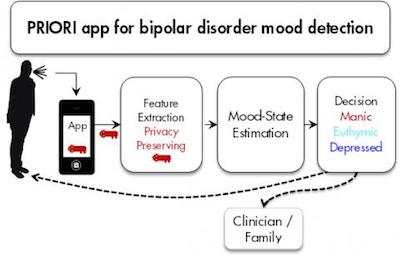 Researchers at the University of Michigan are developing an app that monitors a person's voice during phone calls to detect mood changes in people who have bipolar disorder.
Researchers at the University of Michigan are developing an app that monitors a person's voice during phone calls to detect mood changes in people who have bipolar disorder.
The app, called PRIORI, still needs more testing before it can be commercialized, the researchers said, but a small pilot study of six individuals with bipolar disorder has shown the app has the potential to help warn caregivers of a patient's potential mood shift. This first pilot was funded by the NIH's National Institute of Mental Health and conducted at the University of Michigan Depression Center's Prechter Bipolar Research Fund.
Researchers gave these trial participants mobile phones with unlimited texts and calls. All phones were preloaded with the app, and researchers asked users to treat this phone as their primary mode of contact during the study. The app recorded outgoing speech and then transferred the data to researchers for analysis. At the end of the pilot study, researchers recorded a total of 221.2 hours from 3,588 phone calls.
The participants also had weekly calls with clinicians who evaluated their mood via traditional methods. Researchers compared the results of the traditional clinical assessment with the analysis from the algorithm to decide whether the app could accurately identify the users' moods from the calls made the same day. The team also determined whether researchers could apply the same evaluation to the data from the days before and after the assessment.
From the pilot, researchers found that two extreme mood states, hypomania and depression could be detected and differentiated from euthymia, normal and positive mood.
“These pilot study results give us preliminary proof of the concept that we can detect mood states in regular phone calls by analyzing broad features and properties of speech, without violating the privacy of those conversations,” Research Fellow Zahi Karam said in a statement. “As we collect more data the model will become better, and our ultimate goal is to be able to anticipate swings, so that it may be possible to intervene early.”
The team will continue to develop algorithms for the app during their next trial of 60 patients who are being recruited from people who receive treatment at the University of Michigan Depression Center. The trial is still ongoing and has recruited between 10 and 20 patients so far, University of Michigan Artificial Intelligence Lab Director Satinder Baveja tells MobiHealthNews in an email. He adds that the university is talking to companies about licensing opportunities, but is also exploring the idea of launching a startup.
Another company, Ginger.io has developed a similar system. Ginger.io's app passively collects data from users’ phones including information on their movement throughout the day, call patterns, and texting patterns. Users can also actively record information about how they are feeling each day. If the app senses that something is off with the user, it will automatically notify the user’s family and physician. In March, the University of California Davis’ Early Diagnosis and Preventive Treatment (EDAPT) Clinic launched a study with Ginger.io to follow 120 young people who are in the early stages of psychotic illness for a year.
















